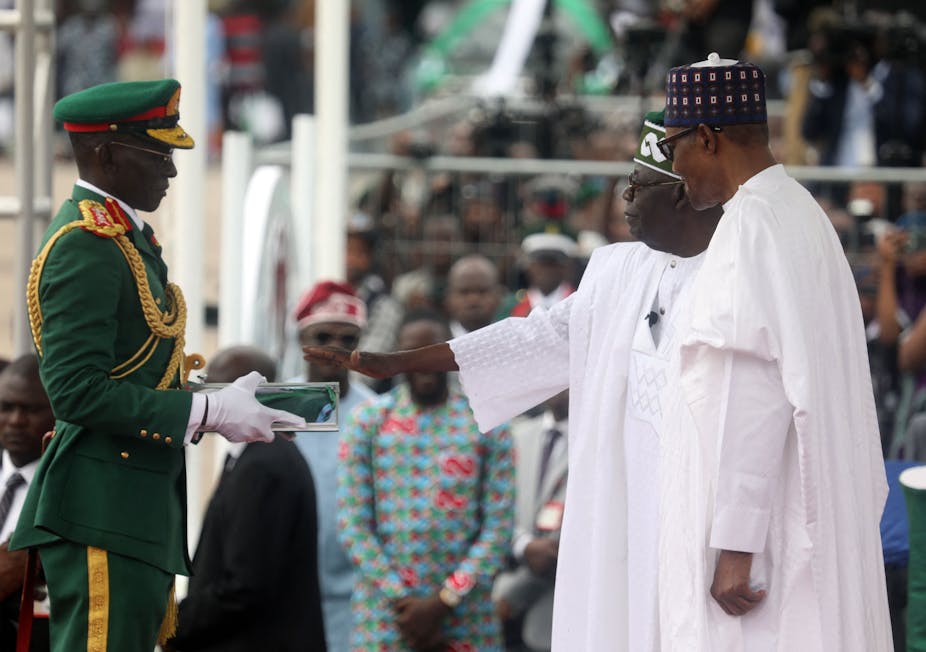Nigeria’s President Bola Ahmed Tinubu recently appointed new military service chiefs alongside a new national security adviser and inspector general of police.
They are expected to play a critical role in the national security architecture of the new administration. The appointment means the president has a technical team to assist him in securing the country.
Public expectation of the team is quite high. This is because of the precarious state and trajectory of Nigeria’s national security over the years.
Tinubu’s government has inherited dire internal security challenges. These include terrorism, banditry, a farmer-herder crisis, communal conflicts and militancy. There is also separatist violence in the south-east.
The government canvassed votes using the mantra of “renewed hope” for Nigerians.
The public appears to have welcomed the new appointments, especially as they seem to represent a fairly balanced national spread.
Almost all the geo-political zones of the country are represented. They include the south-east, which was left out of such appointments during the eight years of Muhammadu Buhari’s reign.
The inclusive spread is crucial for national cohesion. It gives the various parts of the country a sense of belonging. This allays the fear of ethnic or sectional domination or marginalisation.
As a political scientist and researcher in liberal security studies, I propose some measures the security chiefs could take to deliver on their mandates. The proposals highlight the need to reform the workings of the security sector to make it more effective.
I suggest the following:
separate the military from politics
get civilians more involved in security
give the forces what they need to operate
motivate the rank and file better
work smarter, using technology.
The reform is indispensable to revitalise the Nigerian security sector, which has lacked logistics, personnel and strategy.
Depoliticise the military and allied security institutions
There is a need to keep security institutions consciously and deliberately away from politics. This can be achieved by making sure they remain under the control of the civilian authority without losing their ethos and vitality.
They need to be powerful enough to defend the country. But, loyal enough to follow the legitimate dictates of the democratically constituted authority.
The institutions should be professional in their deportment, conduct and operations. For instance, recruitment, placement, promotion, posting and retirement should not be subject to partisan or political influences.
Demilitarise the security sector
Nigeria’s security sector has been so militarised that it works like a sort of praetorian circuit - a close guardian setup exclusive to the combatants. The sector needs to be moderately demilitarised to encourage civilian participation and contributions. The services of un-uniformed technocrats with cognate expertise in aspects of military strategy and allied technical resourcing need to be enlisted in national security governance.
Contemporary security threats are more civil-oriented than military. Non-military occurrences such as armed criminality and violent extremism are much more prevalent than threats of civil war or external aggression. Hence, the involvement of civilians in the national security processes as technical volunteers and undercover agents is crucial.
Motivate rank and file
Nigerian soldiers are arguably poorly equipped, motivated and paid. They are not well looked after, considering the risks and sacrifices that their duties entail.
Most non-commissioned personnel in the Nigerian military, for instance, earn less than N100,000 (about US$130) a month. The average member of the South African National Defence Force earns R17,074 (about US$918) a month.
Enhance capacity for combat operations
Armed violence is becoming increasingly complex and asymmetrical. Countering such threats does not merely require the might of arms. It requires adroit deployment of tactics, intelligence and advanced technology to gain a strategic advantage.
There is a need for a shift in strategy from the current approach, focused on arms and men, to something technically smarter.
There is also a need to build capacity for preemptive, proactive and rapid response to threats.
Optimise operational capabilities
The operational effectiveness and efficiency of the security institutions largely depend on the quality and adequacy of their enabling resources.
Optimal supplies and use of personnel, materials, logistics and funds are a necessity for the improved performance of the institutions.
Conclusion
The newly appointed Nigerian security service chiefs work in a climate of intense public expectation. They are called to succeed where many have failed before. They must fix the systematically distressed national security situation.
The task before the service chiefs is enormous. There is no quick fix. But enhancing the operational efficacy of the national security systems through deliberate structural reforms, no matter how incremental, is imperative.

